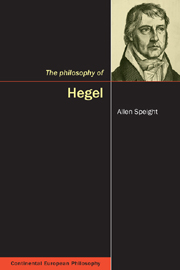Book contents
- Frontmatter
- Contents
- Acknowledgements
- Abbreviations
- Introduction
- 1 German Idealism and the young Hegel
- 2 The Phenomenology of Spirit
- 3 The Logic and Hegel's system
- 4 Ethics and politics
- 5 Hegel and the narrative task of history
- 6 Art, aesthetics and literary theory
- 7 Religion and philosophy
- Notes
- Guide to further reading
- Bibliography
- Index
Introduction
- Frontmatter
- Contents
- Acknowledgements
- Abbreviations
- Introduction
- 1 German Idealism and the young Hegel
- 2 The Phenomenology of Spirit
- 3 The Logic and Hegel's system
- 4 Ethics and politics
- 5 Hegel and the narrative task of history
- 6 Art, aesthetics and literary theory
- 7 Religion and philosophy
- Notes
- Guide to further reading
- Bibliography
- Index
Summary
Hegel is the first great philosopher to make modernity – in all its historical, cultural and philosophical complexity – his subject. And on whatever lines that modernity is to be explored by our own present generation – as a project that has failed, is discernible only in traces, or that has come to fruition in some ways crucial for our practices and commitments – the Hegelian construal of it remains essential for coming to terms with how we understand ourselves, as agents in and contemplators of a world with a number of characteristics that Hegel was either the first or the most articulate in calling attention to. The sort of characteristics I have in mind are some rather resilient facets of a world that can be said to embrace both Hegel's day and our own, a world where the self and its awareness of its freedom is construed as an achievement, where the modern religious sense of a “death of God” has left a not entirely complete secularism and a seemingly irreducible plurality of religious perspectives in its wake, where the development of ethical and political institutions that “we” can in some sense be aware of “making” are nonetheless also subject to historical shifts and constraints, and where the realm of artistic expression has taken bold and inherently self-referential turns.
The account of modernity that Hegel opens up in these areas is, so I shall make the case, neither a triumphalist recognition and extension of Enlightenment values into the present time nor a philosophical act of mourning for the contradictions of a world that is in decline.
- Type
- Chapter
- Information
- The Philosophy of Hegel , pp. 1 - 8Publisher: Acumen PublishingPrint publication year: 2008
- 1
- Cited by

